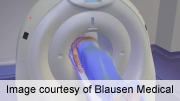
FRIDAY, Feb. 1 (HealthDay News) — Not all children who suffer injuries to their abdomen need abdominal CT scans, according to a new study.
If emergency room doctors assess seven factors when evaluating children with this type of injury, they can protect some of these young patients from unnecessary radiation exposure, said researchers from the University of California, Davis School of Medicine. Radiation exposure can increase the risk of cancer later in life, they noted in a university news release.
The study, published online Feb. 1 in the Annals of Emergency Medicine, involved more than 12,000 children from across the United States who were treated in the emergency department for blunt trauma to the abdomen. Using statistical analysis, the researchers identified the factors that correlated with risk for a serious injury that required acute intervention.
When evaluating children with abdominal injuries, such as those from a car or bicycle crash, a fall or an assault, the researchers suggested that emergency physicians look for evidence of trauma on the abdomen or chest (such as seat-belt marks), neurological changes, abdominal pain or tenderness, abnormal breathing sounds and vomiting.
Children who did not have any of these factors, the researchers found, had just a 0.1 percent chance of needing an abdominal CT scan. They added that in most of these cases, a CT scan would probably not provide additional useful information so exposing a child to unnecessary radiation would not be justified.
“CT scans involve significant radiation risk, especially for children, who are more vulnerable than adults to radiation’s effects,” study principal investigator and lead author James Holmes, a professor of emergency medicine at the UC Davis School of Medicine, said in the news release. “We have now identified a population of pediatric patients that does not typically benefit from a CT scan, which is an important step in reducing radiation exposure.”
The study authors noted the seven factors they identified can help doctors rule out a CT scan, but the presence of one or more factors doesn’t necessarily mandate this test. They noted that doctors must use their judgment and also consider lab tests, ultrasounds and longer periods of observation on a case-by-case basis to determine when a CT scan is needed.
The researchers pointed out that more research is needed to confirm their findings.
More information
The U.S. National Library of Medicine has more about CT scans.

